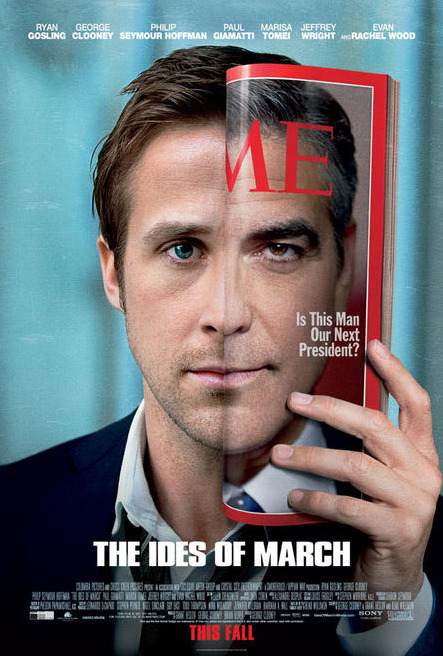Saturday 10 March 2012
The Ides of March (2011) - George Clooney
In politics, loyalty is the only currency we have. Without it you're nothing.
But what happens when you're lured to the opposition? Is the grass really any greener?
Ryan Gosling plays Stephen Meyers, a campaign manager for Governor Mike Morris (George Clooney) in his race for the presidentship. In the process, he is forced to question his own moral principles. When you're the best at your job, others will do whatever it takes to steal your position and take you down. It's a cutthroat world where nobody is quite who they seem and strategy is all that counts. Blackmailed by the media and disillusioned by the man he thought he believed in, temptation and curiosity rear their heads. But when you make a mistake, you lose the right to play. Will Meyers join the corruption? Or leave politics in its sorry state of affairs? As the poster suggests, should we tar Meyers with the same brush as Morris?
Meyers gets caught up in the fast-paced world of US politics; by contrast the viewer is caught up in a fairly slow moving drama. But stick with it and the narrative unfolds in a slowly tightening knot, with Meyers's career at the centre, that twists and turns with increasing intensity. Gosling's stoic performance has little emotional appeal, but suits the depiction of a man internally questioning his loyalties. The other actors, namely Philip Seymour Hoffmann, George Clooney and Paul Giamatti, offer suitably duplicitous performances as they cope with the intelligent and complex script. Knowledge of the US governmental system isn't strictly necessary, this is the story of a man stuck between a rock and a hard place. That the screenplay is based on a play is telling - there is little action here, just a focused dramatic core. There are no heroes or villains in this world, but just as Meyers's loyalty shifts, so does the viewers' sympathy. As a result, the plot is ultimately dissatisfying as we're left wondering if Meyers makes the right decision in the end. At large, though, it represents the corruption at play within politics and has us questioning the true quality of leadership.
On a purely dramatic level, then, the film mostly succeeds. Cinematically, though, Clooney's direction does little to excite or innovate, his purpose solely to serve the story. How does it fair as a representation of US political agenda? As a mere UK citizen, this sort of corruption may seem hard to swallow. Yet with a US election imminent over the next year, the questions that The Ides of March poses are more pertinent than ever.
3/5
